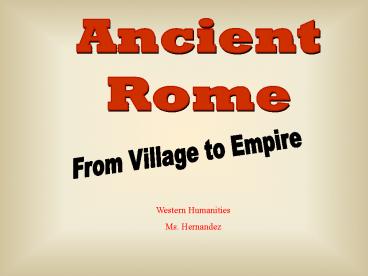Ancient PowerPoint PPT Presentation
1 / 43
Title: Ancient
1
Ancient Rome
From Village to Empire
Western Humanities Ms. Hernandez
2
Why study Ancient Rome?
- Modern Romance languages (Italian, Spanish,
French, Portuguese, and Romanian) trace their
origins to Latin, the language of the Romans. - Form of government (Republic) and policy
- Christianity, which arose during the Roman
Empire, remains one of the worlds main religions - Social classes Tensions between rich and poor
continue to affect society, as they did in the
days of patrician and plebeians - Classical art and architecture
- Inventions Developed road construction methods,
aqueducts, domes, and concrete.
3
What the Greeks are up to
- Greece
- 800-500Homeric Age
- 500-300 Classical Age
- 300s Hellenistic Period
- 133 Romans seize control of Greece
- Rome
- 700s kings rule
- 600s Etruscans rule develop Rome
- 500s Etruscans out, Republic in
- 300s Rome conquers surrounding states
- 200s finished conquering all of Italy
- mid-200s 100s conquest of the Mediterranean
4
Origins of Rome
The Mythical Founding of RomeRomulus Remus
5
Legend versus Reality
- City built by twin brothers who fought for power
- In reality, people began to settle in Rome
because of its location and fertile
soil.basically the GEOGRAPHY of Rome was
favorable - Why did the Romans support a mythical foundation?
6
Rome from village to empire
7
c. 750 BCE Latins (tribe) settle what
becomes Rome
8
See Rome Expand!
9
Lets Talk Topography and Geography
peninsula
mountains
rivers
10
Rome is west of Apennines Mts more fertile land
river access
11
Long ago on a peninsula far, far away
- Apennine Mountains not so rugged as the Greek
mainland, did not divide the country into small
isolated communities - Large fertile plains could support a large
population. Agriculture was the most important
industry in the empire. - Rome was located on Tiber River access to the
Mediterranean Sea - Built on seven hills easily defended military
strategy
12
The early Romans were mostly
farmers
13
PEOPLE Latins -Rome The First
Romans -Influence Latin Language Etruscans -Nor
thern Italy -Urbanized Rome Building
Programs (the Forum) -Influence on Romans the
arch, alphabet Greeks -Southern Italy and
Sicily -Influence on Romans art, architecture,
literature, government, grew olives and
grapes (oh and goats!)
Ancient Italy (c. 6th century B.C.)
14
c. 600 BCE Etruscans Conquer Rome
Romans adopt Etruscan alphabet, art, gods,
building techniques (including the arch)
15
In 509 BCE...
the Romans overthrew the Etruscans
16
Rome Spreads its Power
- Romans defeat Etruscans in north and Greek
city-states in south - Treatment of Conquered
- Forge alliances
- Offer citizenship
- By 265 B.C., Rome controls Italian peninsula
17
Its interesting to note that this was the
precise time that we think of Greece as entering
its Classical Era.
18
Unlike the Athenians, who had a direct or
participatory democracy, the Romans established a
representative democracy, or, a republic
like we have today
19
Roman social structure
- Patricians wealthy landowners and office-holders
- Plebeians farmers, artisans, traderscould vote
but not hold political office
- Slaves mostly prisoners of warnot citizensno
rights
20
Roman Religion
- polytheistic
- absorbed gods of others, including the Greeks
- lots of public festivals
21
Roman Women
- educated just like boys
- couldnt vote but could testify in court
- gained property rights
- more influence in family than Greek women
22
THE TWELVE TABLEScarved stone tablets
451 BCE First Roman Law Code
- 451 B.C., officials carve Roman laws on twelve
tablets and hung in Forum. - Laws confirm right of all free citizens to
protection of the law - Become the basis for later Roman law
23
The Roman Forum
- Political center of Roman Empire
- Ideal place for dramatic public speeches
- Town Square, mall (vendors), and government
center
24
Gradually, the Romans began to expand their
control
25
until they had conquered the entire Italian
peninsula plus the islands of Corsica,
Sardinia and Sicily
26
As they expanded their control
the Romans built an excellent network of roads
27
Heres how they built them
28
Their road system is one of the Romans greatest
achievements
Why do you think they built them?
29
Right! The Roman road system
- allowed easy military transport
- enabled trade and commerce
- helped unify expanding Roman territories
30
Back to Roman expansionwho do you think would be
a likely rival for control of the Mediterranean
Sea?
31
Right again!
Carthage!!
32
Between 264-146 BCE the Romans fought 3 wars with
Carthage, known as the Punic Wars.
33
Rome wonand went on to conquer the rest of the
Mediterranean world.
34
(No Transcript)
35
(No Transcript)
36
(No Transcript)
37
(No Transcript)
38
(No Transcript)
39
(No Transcript)
40
The period 27 BCE-180 AD (the last two maps) is
known as the
PAX ROMANA
41
During this period
- Romans thought they were the entire civilized
world
- Rome enjoyed military dominance
- The population of the city of Rome reached 1
million
- Trade increased, bringing a wealth of resources
into Rome
- The arts flourished
42
Well, thats it for our quick overview of Romes
journey from small village to huge empire. Over
the next several weeks we will concentrate on the
following
- the influence of Greek culture upon the Romans
- Roman contributions to politics, technology and
the arts
- the rise of Christianity within the Roman Empire
- reasons for the decline and collapse of the
Empire
43
That's all, folks!

